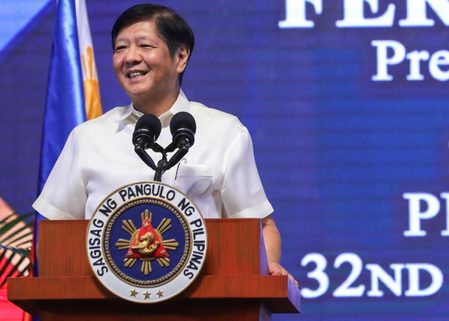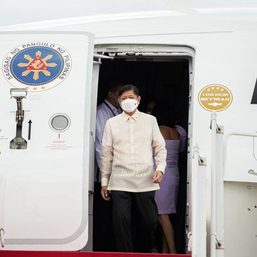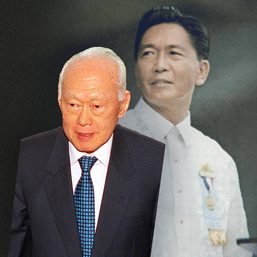SUMMARY
This is AI generated summarization, which may have errors. For context, always refer to the full article.

MANILA, Philippines – Philippine President Ferdinand Marcos briefed Singaporean business leaders about economic developments in the country, including the contentious Maharlika Investment Fund, as well as flagship infrastructure projects, in a bid to entice them to consider investing.
The economic team, led by Finance Secretary Benjamin Diokno, held the seventh Philippine Economic Briefing in Singapore on Thursday, June 15, where some 110 foreign investors attended.
Diokno told investors the Maharlika fund will be an important addition to the country’s existing funding mechanisms, with the aim of promoting socioeconomic development through investments in strategic, high-return, high-impact sectors.
“The Maharlika Investment Fund is designed to advance the Philippines’ long-term development goals through the effective intergenerational management of our government financial assets,” he said.
Responding to a question on Maharlika’s priorities, Diokno said, “We have identified another source of funding for these very important infrastructure projects that will make a difference in the landscape of the Philippine economy. It [also] has commercial purposes because the fund has to earn money. So you have short-term, long-term investment, and we propose to create several sub-funds – infrastructure fund, maybe a green fund, and so on.”
Some of the Philippines’ renowned economists have publicly criticized the Maharlika fund, including faculty of the University of the Philippines School of Economics going as far as saying the fund “violates the principles of economics and finance” due to its vague provisions and lack of focus.
Marcos’ economic team pushed back, saying that the Maharlika is aligned with the country’s medium-term fiscal framework and eight-point socioeconomic agenda.
Meanwhile, National Economic and Development Authority Secretary Arsenio Balisacan briefed investors about Marcos’ infrastructure program, consisting of 194 projects worth P8.3 trillion.
Economic managers also highlighted the country’s declining inflation rate, lower corporate income taxes, and its more liberal business environment.
The economic team’s pitch to Singaporean investors comes as the Philippines is set to be elevated to upper middle-income status, which means that the country will no longer be entitled to the same official development assistance funding.
According to the World Bank, an upper middle-income country has a per capita income range of $4,256 to $13,205. The Philippines is currently a lower middle-income country, with a gross national income per capita of $3,640.
Singapore is the Philippines’ top source of foreign direct investment inflows, with investments in key sectors including renewable energy, infrastructure, healthcare, manufacturing, and information and communications technology. It is also the Philippines’ seventh largest trading partner globally, fifth largest export market, and sixth largest import supplier. – Rappler.com
Add a comment
How does this make you feel?

![[In This Economy] Is the Philippines quietly getting richer?](https://www.rappler.com/tachyon/2024/04/20240426-Philippines-quietly-getting-richer.jpg?resize=257%2C257&crop=194px%2C0px%2C720px%2C720px)
![[In This Economy] A counter-rejoinder in the economic charter change debate](https://www.rappler.com/tachyon/2024/04/TL-counter-rejoinder-apr-20-2024.jpg?resize=257%2C257&crop=267px%2C0px%2C720px%2C720px)
![[Vantage Point] Joey Salceda says 8% GDP growth attainable](https://www.rappler.com/tachyon/2024/04/tl-salceda-gdp-growth-04192024.jpg?resize=257%2C257&crop_strategy=attention)
![[ANALYSIS] A new advocacy in race to financial literacy](https://www.rappler.com/tachyon/2024/04/advocacy-race-financial-literacy-April-19-2024.jpg?resize=257%2C257&crop_strategy=attention)

![[OPINION] Controversy over ASEAN’s ‘Swift’ week](https://www.rappler.com/tachyon/2024/03/tl-asean-swift-week.jpg?resize=257%2C257&crop=357px%2C0px%2C720px%2C720px)



There are no comments yet. Add your comment to start the conversation.